Cozumel Thimble Jelly Fish
Reports of the Start of Thimble Jelly Fish Season
While NOT life threatening “sea lice” can add an itchy aspect to water sports …
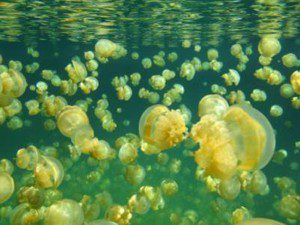 Popular swimming and snorkeling spots in Cozumel have been reporting sightings of thimble jellyfish (aka: sea lice or Linuche unguiculata) While they don’t pose any sort of serious health threat, individuals who come into contact with these sea creatures can experience skin inflammation, burning, stinging or itchiness.
Popular swimming and snorkeling spots in Cozumel have been reporting sightings of thimble jellyfish (aka: sea lice or Linuche unguiculata) While they don’t pose any sort of serious health threat, individuals who come into contact with these sea creatures can experience skin inflammation, burning, stinging or itchiness.
They’re easily identified by their circular 1” appearance, and are conspicuously covered with mottled brown markings. Preventative measures against accidental contact include, rash guards, t-shirts, or even selected sunscreens – such as sea safe – which can coat the skin and provide a protective barrier.
Thumble jellyfish don’t seek out human contact, and, in fact, spend most of their 6 month life span, floating around near the surface in groups feeding on plankton and algae. They’re considered a delicacy for sea turtles, spadefish and sunfish who are considered to be their largest predators.
They travel, through currents and ocean tides, and make periodic appearances in the era sometime between March and July. In fact, it’s been hypothesized that sea turtle laying season oftentimes coincides with the appearance of Thimble Jellys since turtles are so attracted to this rich food source.
If you do happen to come into contact with any form of sea life it’s recommended to immediately wash the afflicted area with ocean water. Do not use fresh water, or rub vigorously as this could activate more stinging cells and actually make the situation worse. It’s also best to avoid alcohol, liquor or even the popular urban legend of using urine, since this too could cause additional reactions.
Back on land, should the irritation persist popular remedies include very hot water, vinegar or over-the-counter itch cream. Should your 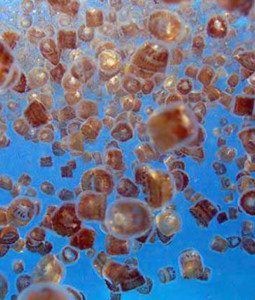 skin be very badly affected, it might even be advisable to seek medical attention.
skin be very badly affected, it might even be advisable to seek medical attention.
Generally speaking the skin irritation can last from a few days to a few weeks, and is not considered serious. The most important be of advice would be to NOT SCRATCH, as this can also spread or prolong the itch.
Ya se tienen reportes del inicio de temporada de la medusa dedal
Si bien la “pulga marina” NO es letal, puede añadir picazón a los deportes acuáticos…
Los sitios populares para nadar y practicar esnórquel en Cozumel has reportado la presencia de la medusa dedal (también conocida como pulga marina o Linuche unguiculata). Aunque ésta no es una amenaza para la salud, las personas que llegan a estar en contacto con estas criaturas marinas pueden presentar inflamación de la piel, sensación de quemazón o de picazón y comezón.
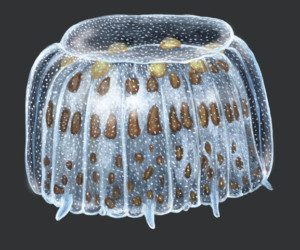 Se les puede ver fácilmente debido a su apariencia circular de 1” y visiblemente cubiertas de motas color café, Las medidas de prevención para evitar el contacto accidental, incluyen protectores contra erupciones, el uso de camisetas o, incluso, protectores solares selectos – como ‘Sea Safe’ – que pueden crear una capa sobre la piel así como una barrera protectora.
Se les puede ver fácilmente debido a su apariencia circular de 1” y visiblemente cubiertas de motas color café, Las medidas de prevención para evitar el contacto accidental, incluyen protectores contra erupciones, el uso de camisetas o, incluso, protectores solares selectos – como ‘Sea Safe’ – que pueden crear una capa sobre la piel así como una barrera protectora.
Las medusas dedal no buscan el contacto humano, y de hecho la mayor parte de sus 6 meses de vida la pasan flotando cerca de la superficie, en grupos, alimentándose de plancton y algas. Se consideran un manjar para las tortugas marinas, peces espada y peces sol, considerados los depredadores más grandes.
Éstas viajan a través de las corrientes y mareas, y aparecen periódicamente entre Marzo y Julio. De hecho, se especula que el ciclo de anidación de las tortugas coincide con la aparición de los dedales en virtud de que esta rica fuente alimenticia atrae a las tortugas.
En caso de que llegue a estar en contacto con cualquier forma de vida marina se recomienda que de inmediato enjuague con agua de mar la zona afectada. No use agua dulce ni talle con fuerza pues ello activará más células urticantes empeorando la situación. Lo mejor es evitar el alcohol, licores e incluso la leyenda urbana de usar orina ya que ello puede causar reacciones adicionales.
Una vez que se encuentre en tierra firme, en caso de que persista la picazón, los remedios populares incluyen el uso de agua muy caliente, vinagre y crema antipruriginosa de venta libre. Si su piel se ha visto gravemente afectada, es recomendable acudir al médico.
La irritación de la piel puede tener una duración de varios días hasta varias semanas, y no se considera como grave. El consejo más importante es NO RASCARSE, ya que ello puede propagar la picazón o prolongar la comezón.
______________________________
Una ex yanqui de Connecticut quien llama hogar a Cozumel desde hace más de 15 años. Laura escapó al Caribe hace años, desplazándose de una isla a otra dando clases de BUCEO. Se dedicó a perder el tiempo en Jamaica y finalmente se detuvo en Cozumel para pasar unas vacaciones de 2 semanas que aún no terminan. Convenciendo a sus padres que pagaran una elegante universidad privada, obtuvo su título en Periodismo y Laura crea semanalmente Cozumel 4You, medios sociales y artículos promocionales sobre la Isla y también es moderadora en el grupo Cozumel 4 You en Facebook que actualmente cuenta con 25,000 miembros. Fabián, s umuy tolerante marido, desde hace mucho tiempo se resignó a no tener vida privada, pues se ha visto implicado en los diversos proyectos y planes que urde Laura. Son orgullosos padres de diversos perros y gatos rescatados. Mientras contempla su paso a través de la vida en el Caribe mexicano,Laura continúa siendo la pesadilla en la existencia de su muy tradicional suegra mexicana.
- mayan crossing May - April 12, 2025
- Cabana Beach Cozumel - April 12, 2025
- Cozumel Civil Protection Easter Week - April 12, 2025
An ex-Connecticut Yankee who has called Cozumel home for over 18 years, Laura ran away to the Caribbean years ago, bumped around the islands teaching SCUBA diving, lost some time in Jamaica, and finally stopped in Cozumel for a 2 week vacation that hasn’t ended yet. With a degree in Journalism from a fancy private college she convinced her parents to pay for, Laura writes, edits, and creates the weekly Cozumel 4 You news, social media, and promotional articles about the island, as well as moderates the Cozumel 4 You Facebook group, which currently has over 25,000 members. Her long suffering husband, Fabian, has long since resigned himself to having zero private life, as he’s been involved in her various schemes and plots since his arrival. Proud parents to a variety of rescue dogs and cats, Laura continues to be the bane of her traditional Mexican mother-in-law’s existence, as she muses her way through life in the Mexican Caribbean. ______________________________ Una ex yanqui de Connecticut quien llama hogar a Cozumel desde hace más de 15 años. Laura escapó al Caribe hace años, desplazándose de una isla a otra dando clases de BUCEO. Se dedicó a perder el tiempo en Jamaica y finalmente se detuvo en Cozumel para pasar unas vacaciones de 2 semanas que aún no terminan. Convenciendo a sus padres que pagaran una elegante universidad privada, obtuvo su título en Periodismo y Laura crea semanalmente Cozumel 4You, medios sociales y artículos promocionales sobre la Isla y también es moderadora en el grupo Cozumel 4 You en Facebook que actualmente cuenta con 25,000 miembros. Fabián, s umuy tolerante marido, desde hace mucho tiempo se resignó a no tener vida privada, pues se ha visto implicado en los diversos proyectos y planes que urde Laura. Son orgullosos padres de diversos perros y gatos rescatados. Mientras contempla su paso a través de la vida en el Caribe mexicano, Laura continúa siendo la pesadilla en la existencia de su muy tradicional suegra mexicana.
Cozumel Property Tax & Garbage Taxes
Cozumel Property Tax & Garbage Taxes Property Tax & Garbage Collection Fines...
Cozumel Water Pressure CAPA
Cozumel Water Pressure CAPA Cozumel. Problems in water supply due to...
Foundation Parks Museums membership card Residents
Foundation Parks Museums membership card Residents Foundation Parks and Museums membership...
Cozumel shipping companies seek tax benefits
Cozumel shipping companies seek tax benefits Cozumel shipping companies seek inclusion in...







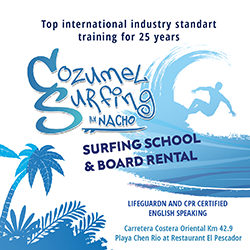

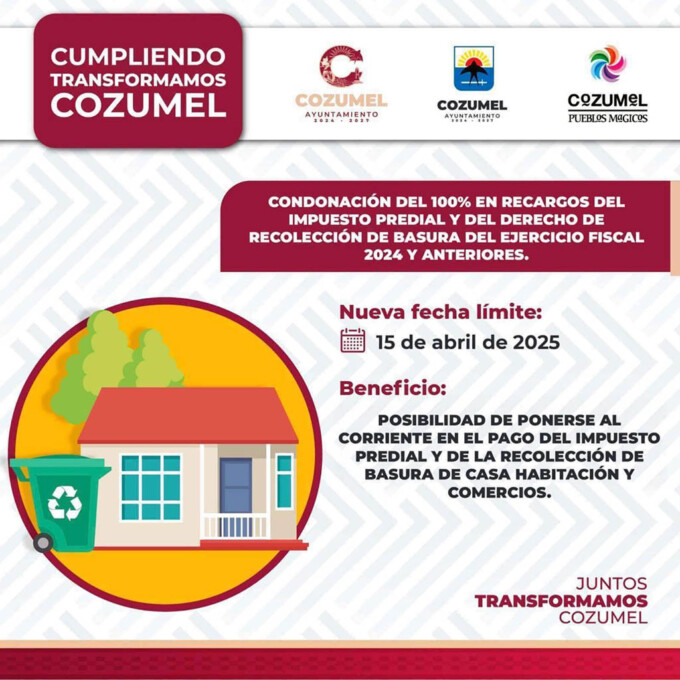









Leave a comment